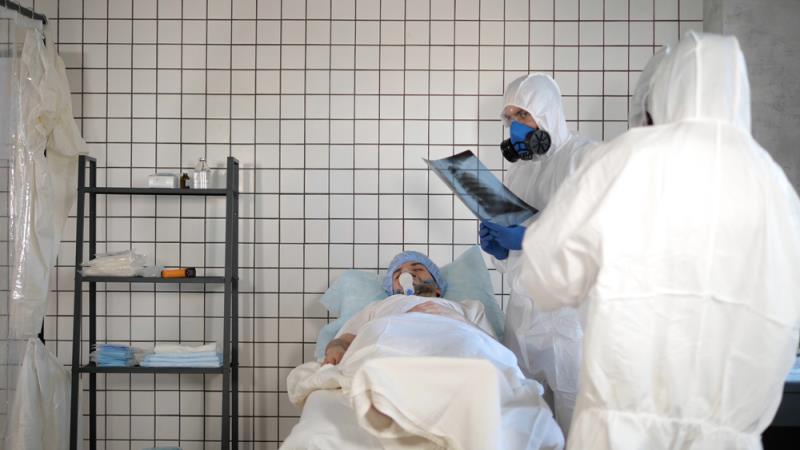Additional cancer deaths predicted due to delayed diagnosis during COVID-19





Substantial increases in cancer deaths may be anticipated due to delays in diagnosis during the coronavirus disease 2019 (COVID-19) pandemic, modelling studies in the UK have reported.
In one study, researchers found that 3,291–3,621 additional deaths from breast, colorectal, oesophageal or lung cancer could occur over the next 5 years as a result of diagnostic delays due to COVID-19. [Lancet Oncol 2020, doi: 10.1016/S1470-2045(20)30388-0]
The researchers analyzed UK National Health Service (NHS) cancer registration and hospital administrative data from patients (age, 15–84 years) diagnosed with breast (n=32,583), colorectal (n=24,975), oesophageal (n=6,744) or lung (n=29,305) cancer in 2010–2012 to estimate the effect of delayed diagnosis on cancer survival.
With the UK’s cancer screening and routine outpatient referral pathways suspended since 16 March 2020 in response to a nationwide lockdown, only urgent symptomatic cases were prioritized for diagnostic intervention. The researchers thus modelled the impact of reallocating patients from usual screening and nonurgent routine referral pathways (ie, GPs and secondary care, through which 30–40 percent of patients are diagnosed) to urgent and emergency pathways (associated with more advanced disease stage at diagnosis), for 1 year after the physical distancing measures were introduced.
Results showed an estimated 7.9–9.6 percent increase in deaths due to breast cancer, or 281–344 additional deaths, up to 5 years after diagnosis compared with figures before the pandemic. The corresponding estimated increase in death was 15.3–16.6 percent (1,445–1,563 additional deaths) for colorectal cancer, 4.8–5.3 percent (1,235–1,372 additional deaths) for lung cancer, and 5.8–6.0 percent (330–342 additional deaths) for oesophageal cancer.
“These avoidable cancer deaths are projected to translate into 59,204–63,229 total years of life lost,” the researchers reported.
“On average, for each avoidable cancer death due to diagnostic delay, 20 years of life will be lost, reflecting a substantial proportion of deaths in young people in their most productive years,” said co-author Professor Richard Sullivan from King’s College London, UK.
“As normal life gradually resumes, we need accurate and measured public health messaging tailored towards patients, GPs and secondary care, which puts into perspective the risk of death from COVID-19 compared with that of delaying cancer diagnosis,” said co-author Dr Camille Maringe from the London School of Hygiene & Tropical Medicine, UK.
“The healthcare community also needs to establish clear criteria to prioritize patients on clinical grounds, to absorb the cancer patient backlog and maintain equitability in care delivery,” suggested co-author Professor Bernard Rachet from the London School of Hygiene & Tropical Medicine, UK.
In another study, researchers predicted 181–542 additional deaths from 20 common cancers due to delays in patient presentation and referral during the 3-month UK-wide lockdown, and 401–1,231 additional deaths due to diagnostic delays in dealing with this backlog of uninvestigated patients. [Lancet Oncol 2020, doi: 10.1016/S1470-2045(20)30392-2]
The study was conducted using age- and stage-stratified 10-year cancer survival estimates for 20 common tumour types diagnosed in the UK in 2008–2017 among patients aged ≥30 years, as well as data for cancer diagnoses made via the 2-week-wait urgent referral pathway in 2013–2016 from NHS Digital.
“Our estimates also suggest that for many cancer types, delays in diagnosis and treatment for as short as 2 months will lead to a substantial proportion of patients with early-stage tumours progressing to having incurable disease,” said lead investigator, Professor Clare Turnbull from the Institute of Cancer Research, UK.
“For patients aged <70 years, the estimates suggest that all diagnostic delays should be avoided, as the survival decrement for even a 2-month delay is substantial for most tumours. For those aged ≥70 years, however, the per-referral risk of death from nosocomial infection is much higher and may exceed the average survival decrement of a moderate delay in diagnosis, particularly for more indolent cancer types [eg, prostate cancer] or cancers with poor overall prognosis [eg, upper gastrointestinal tract cancers],” the researchers reported.